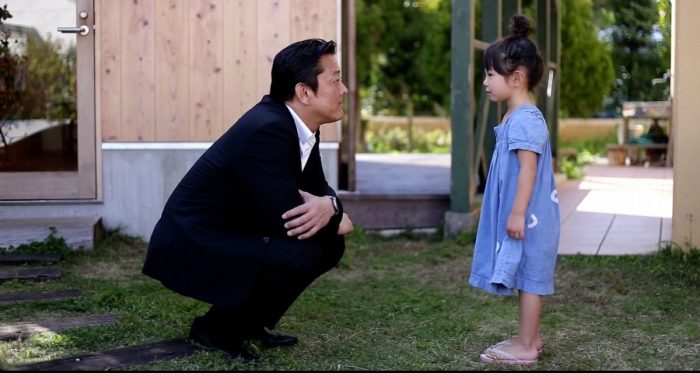Director: Saiko Kitagawa
Polaris – the North Star – is transformed into a tiny local bookshop in Saiko Kitagawa’s quaint tale of lost-and-found. When a cynical working man returns to his childhood home of Okinawa, his encounters with three locals – the owner of the bookshop, a strident young mother, and a young girl wise beyond her years – offer him a chance to re-navigate. This journey into his youth forces him to confront his own guilt as a distant father, and the result is a charming and quirky look at childhood innocence vs. adult reticence.
Polaris, the bookshop, stocks only picture-books, and the film Polaris also has a zany picture-book feel. Images of the young girl leaping and grinning in a cornflower blue dress have all the candy-coloured vibrancy of an illustration. Meanwhile, an interesting conceit deployed throughout is the use of intertitles. In the vein of the silent film, these dialogic title cards lend a cosy nostalgia, reading like the pages of a Dr Seuss, playfully extending a hand to the viewer. Collapsing the fourth wall, it is unclear whether its bid farewell – ‘You can come again anytime’ – is directed towards the homecoming protagonist or to us.
If we were to return, there’s a lot to like in this snuggly reflection of childhood. The bookshop itself, a small little nook of a place, boasts its book collection on shelves which line the back wall. Placed upright like multi-coloured windows, each illustration draws the curious eye. One particular picture is the favourite of the bookshop owner: a childish scrawl of an old woman knitting. This picture, he says, brings him comfort – a comfort which allows him to truly live again, something which our monochrome protagonist has forgotten how to do.

“Do you know that you are alive?” he asks the visitor, stopping him with a soul-searching stare. These stares nail in on a guilty soul, having lost touch with his own innocent youth but, perhaps more crucially, having lost touch with his daughter. A particularly comic moment sees the man pile up every book in the shop as a gift to this daughter. This act, and the aghast side-eyes it gains from the onlookers, is amusingly silly – but it also holds an emotional truth. It is a vain attempt to purchase the connection he’s always lacked with his own child; a child he barely knows the age of and, in a moment of despairing hopelessness, he admits, he’s ‘not sure what she’d like’.
Gô Maejima nicely conveys the scepticism and latent remorse of a man who has lost his way. In his monochrome suit, he is a blot of the jaded adult world smeared across this sunshine-y idyll. But, in the end, a faint smile, a deep breath, and a lightness of step offers a hopeful future for this newcomer.
This little bookshop, like Polaris itself, forms the focal point through which his life might be set back on the right track. This infectious optimism, set against a jaunty, percussive soundtrack, asks us to look at life anew, as we might not even realise that we haven’t really been living at all.





